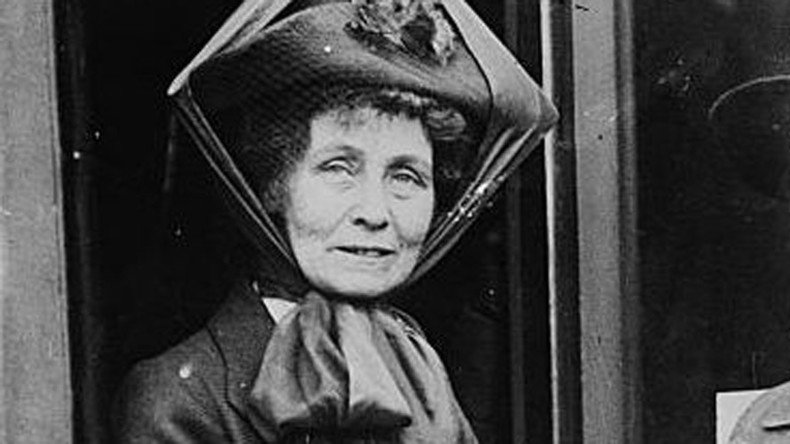7 reasons to feel defiant on International Women’s Day

Women fought mercilessly for property rights, voting rights, legal rights, and the right to education. On International Womens Day, it’s worth remembering where these battle lines were drawn.
Until relatively recently, women have had far fewer rights than their male counterparts. Viewing their struggle as a human rights issue has been fundamental in the global fight for equality.
A few landmark moments along this path to gender equality are worth noting.
1. Women as legal entities
In 1929, a British court was forced to declare that women could be described as “persons” so that they would receive the same treatment as men.
Surely the best protest sign at a women's equality demonstration, ever. #InternationalWomensDaypic.twitter.com/Ia92UjPAcL
— Girl Code (@grilcode) March 8, 2016
Addressing the court as the proceedings wound down, one of the judges said: “To those who ask why the word ‘person’ should include females, the obvious answer is why should it not?”
2. Women as extensions of their husbands
Throughout history, women in Britain and elsewhere were forced to surrender their material wealth after marriage. However, an Act of Parliament introduced in 1870 allowed married women to keep the money they earned and to inherit some property.
By 1893, married women had been granted control of all property they acquired during marriage.
Don't forget the revolutionary roots of #InternationalWomensDayhttps://t.co/xDPa614ApE
— UK Uncut (@UKuncut) March 8, 2016
People’s enjoyment of property is recognized today as a human right under Article 1, Protocol 1 of the European Convention on Human Rights.
3. The right to vote
Women were not allowed to vote in parliamentary elections before 1918. In the early 20th century, multiple campaigns fought for women’s right to vote. One such campaign was the Suffragettes, an activist group run by Emmeline Pankhurst and her daughters.
The Representation of the People Act, implemented in 1918, gave women aged over 30 the right to vote. However, this privilege was confined to those who fulfilled certain property criteria.
Some of the phenomenal women fighting for justice, equity and peace https://t.co/J1A4CVwfCT#InternationalWomensDaypic.twitter.com/jMA8w6uYJO
— Global Justice Now (@GlobalJusticeUK) March 8, 2016
It wasn’t until 1928 that all women in Britain had gained equal voting rights with men.
The right to vote and stand in elections are recognized as human rights under Article 3, Protocol 1 of the European Convention on Human Rights.
4. The right to learn
The University of London was the first institution of its kind to allow women to study degrees. By 1880, four young ladies had been awarded Bachelors of Arts degrees by the college.
The mortgage is just one of many things women pay more for #InternationalWomensDayhttps://t.co/vdkutzeWmIpic.twitter.com/W854HM7I8x
— MarketWatch (@MarketWatch) March 8, 2016
The right to access educational institutions in the absence of discrimination is a human right under Article 2, Protocol 1 of the European Convention on Human Rights. Nevertheless, millions of young women and girls across the world are still denied this privilege today.
5. The right to family planning and bodily autonomy
An Act of Parliament was passed in 1839 giving mothers the right to demand custody of their children in the event of marital breakdown. Prior to this, mothers had no legal rights in relation to their children if their marriage broke down.
By the late 20th century, women also gained greater control over their reproductive rights. Parliament passed the Abortion Act 1967 to allow abortions under medical supervision in accordance with certain criteria. By 1974, contraception had become freely available to all women through the National Health Service (NHS) irrespective of marital status.
The decision to have an abortion is a right of any woman, without interference from politicians. #InternationalWomensDay
— Bernie Sanders (@BernieSanders) March 8, 2016
The right to bodily autonomy and the right to respect for family life are protected under Article 8 of the European Convention on Human Rights. The European Court recently ruled that women in Ireland do not have adequate access to abortion facilities.
6. Legal protection from violence
Women were legally allowed to seek separation from their husbands in 1878 if his actions were deemed to be violent. By 1991, rape in marriage had been declared a crime in Britain.
Celebrate #InternationalWomensDay with these great new books by women https://t.co/iAQfPX9JiY#IWD2016
— Arianna Huffington (@ariannahuff) March 8, 2016
Today, female genital manipulation (FGM) is a serious issue, and is often executed for cultural reasons. Although the practice is illegal in Britain under the Female Genital Mutilation Act 2003, it still affects an estimated 137,000 women in the UK.
7. Work place equality
Women at the Ford car factory in Dagenham took part in an industrial strike for equal pay in 1968, almost bringing production across all of the firm’s UK plants to a halt. The protest paved the way for the passing of the Equal Pay Act 1970, which was later amended to offer equal pay.
This is so important. Thank you @ddlovato 👏🏻 #InternationalWomensDaypic.twitter.com/qJoUy8XYXv
— Shady Music Facts (@musicnews_shade) March 8, 2016
The Equality Act 2010 consolidated this law, ensuring women are protected from discrimination on the grounds of sex or maternity in the workplace.
Protection from discrimination is a human right under Article 14 of the European Convention on Human Rights.












